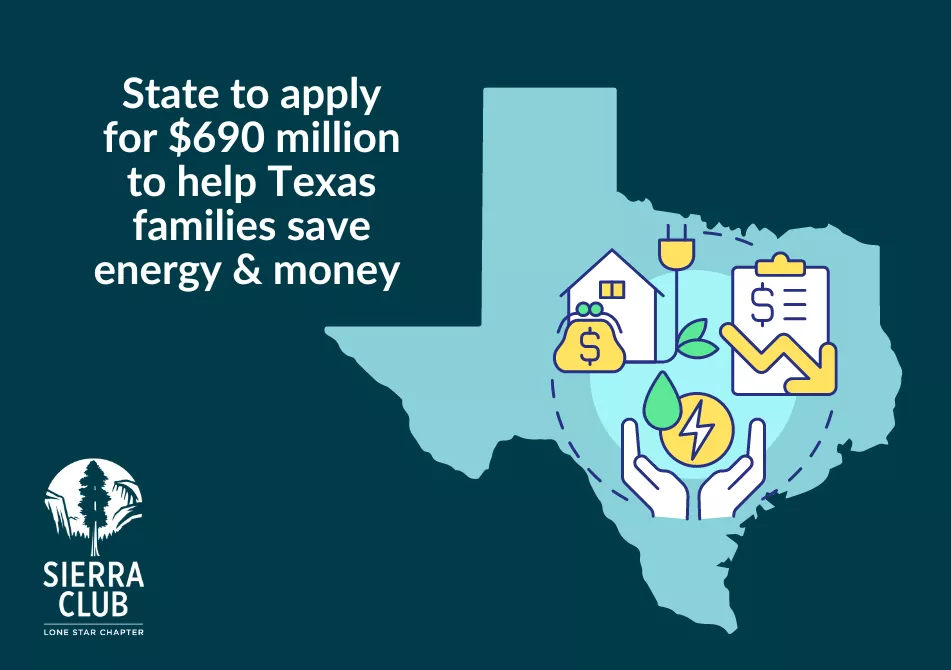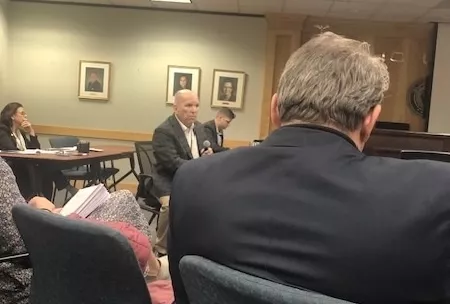
Image created in Canva using a graphic designed by ruslannesterenko
By Cyrus Reed
Today, during an “Energy Efficiency Implementation Project” meeting at the Public Utility Commission of Texas, State Energy Conservation Office (SECO) Director Eddy Treviño made an important announcement - yes, SECO, a unit of the Texas Comptroller of Public Accounts, will apply for all $690 million allocated for Texas under the Department of Energy’s “HOMES” and “HEARS” programs, authorized by the Inflation Reduction Act of 2022.
Both the Home Efficiency Rebates program (known as the HOMES program) and the Home Electrification and Appliance Rebates (HEARS program) collectively provide $8.8 billion nationwide, and will help American households save money on energy bills, upgrade to clean energy equipment, improve energy efficiency, and reduce indoor and outdoor air pollution. The DOE estimates that these rebates will save households up to $1 billion on energy bills nationwide each year and support over 50,000 U.S. jobs. The programs are specifically designed to help low- and moderate-income residential electricity users, and can help install modern appliances like heat pumps, hot water heat pumps, and energy efficient stoves and refrigerators, and other upgrades like better windows and insulation.
Earlier this year, the Lone Star Chapter of the Sierra Club sent a letter signed by some 25 organizations urging Treviño and Comptroller Glen Hegar to apply for all the money available from the Department of Energy because it would help create jobs, save energy, reduce pollution, and make our electric grid more reliable.
“We are very pleased that Comptroller Hegar, and SECO have come up with a smart way to assure that Texans will have access to these federal funds,” said Cyrus Reed, Legislative and Conservation Director of the Lone Star Chapter of the Sierra Club. “We look forward to working with SECO and the future administrators, and utility companies to put together a strong application and make sure the money is spent efficiently and widely to help all Texans and our electric grid.”

Image courtesy of Cyrus Reed. Eddy Treviño, director of the State Energy Conservation Office, announces that Texas will apply for federal funds to help residential consumers save energy. PUCT commissioner Kathleen Jackson can be seen listening intently.
To put that in perspective, $690 million for home and multi-family energy efficiency upgrades and efficient appliances would be the largest such investment in residential energy efficiency ever in Texas. Currently, the eight main investor-owned utilities that annually run energy savings programs only spend a little more than $100 million per year on both residential and commercial energy efficiency programs.
Key dates:
May 31, 2024 - Early administrative funding application deadline
August 16, 2024 - Deadline for notice of intent to apply for or decline funds
January 31, 2025 - Application deadline
In making the announcement during the meeting, Treviño, a 19-year veteran of the office, said the intent of SECO is to apply on or before May 31st, 2024 for some initial administrative funds of approximately $5 million and will also put out an RFP (request for proposal) for third-parties to actually administer the programs in Texas. SECO is a relatively small unit of the Comptroller and has just a handful of staff, meaning that applying and managing two such large programs would be challenging. Treviño also said their desire is to have one administrator for both main programs. The final full application is not due until January of 2025, but many states are applying early to take advantage of the initial administrative funds.
Treviño said it is likely that Texas would apply formally with the full application sometime in late 2024 or early 2025, meaning applications for Texans to take part in the programs will likely be available in mid-2025. The State will have several years to spend the money and will also need to develop an implementation blueprint that includes:
- Community benefits plan
- Education and outreach strategy
- Consumer protection plan
- Utility data access plan
- Privacy and security risk assessment for state systems
- Market transformation plan (must be submitted within 1 year of program launch)